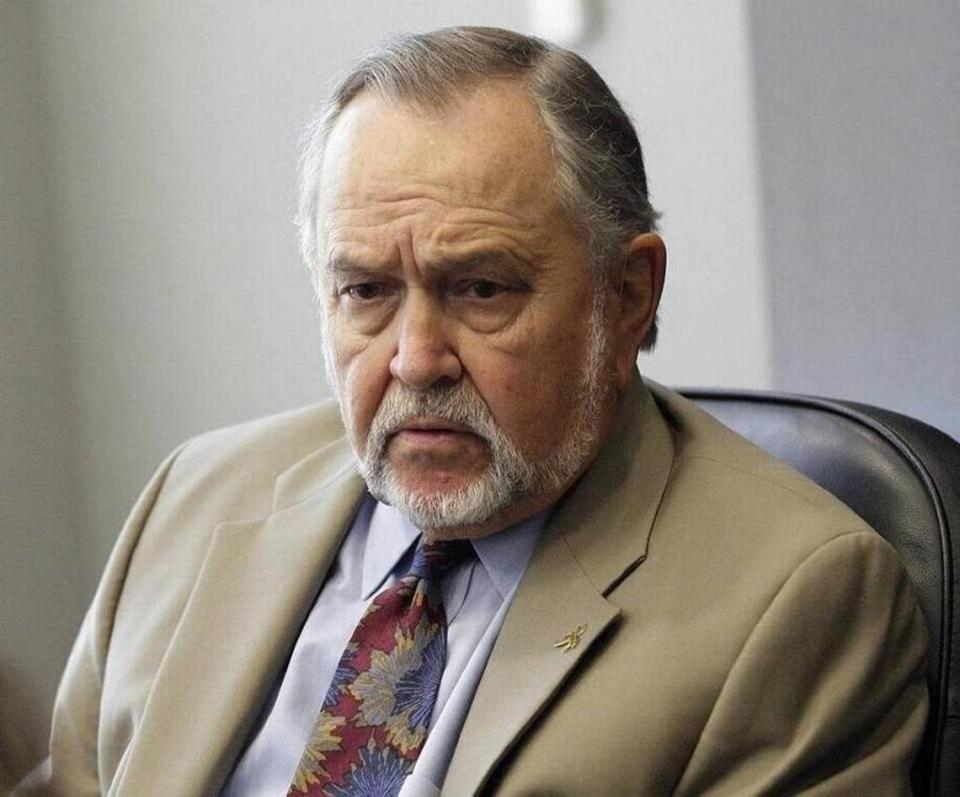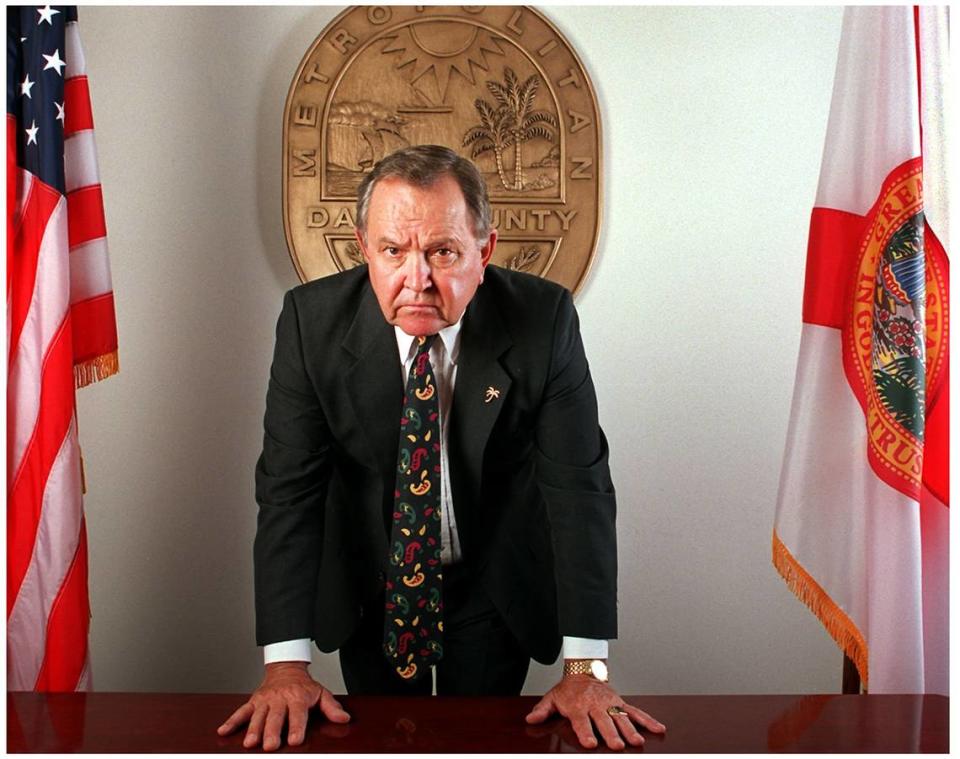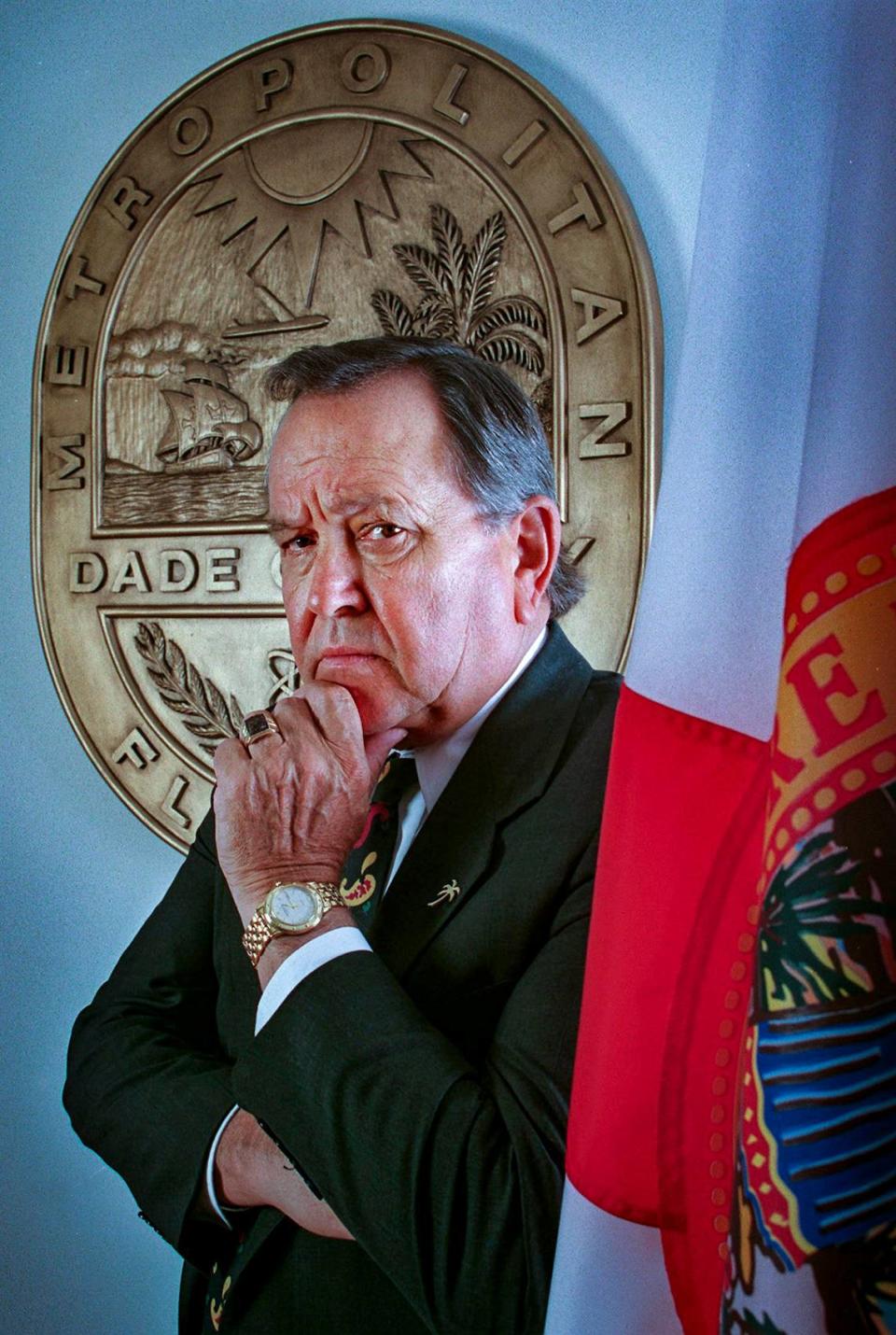Merrett Stierheim, county manager who shaped modern Miami-Dade’s government, dies at 90
Merrett R. Stierheim, the Dade County manager who helped create a modern metropolitan government in the 1970s and ‘80s and whose reputation as a blunt, skilled public administrator made him the go-to turnaround pick for troubled bureaucracies in the 1990s and early 2000s, died on Sunday. He was 90.
In a career that started with an internship at Miami City Hall in 1959, Stierheim completed a remarkable circuit through the top ranks of local government.
Altogether, he served as superintendent of county schools, Miami’s city manager, twice as county manager – first in Dade County, then returning after the name change to Miami-Dade – director of the county’s tourism bureau, and interim manager of both Doral and Miami Lakes. That doesn’t cover his stint on Florida’s West Coast, first as city manager in Clearwater and then as Pinellas County manager before he returned to take the top job in Dade.

“He was just a force of nature,” said Jennifer Moon, a junior administrator under Stierheim in the 1990s who went on to become a deputy mayor in Miami-Dade. “He created the culture of the government.”
‘Mr. Manager’ ran county’s government, school system
Serving as Dade County manager between 1976 and 1986 formed the centerpiece of Stierheim’s career as a public administrator as he presided over the transformation of a bureaucracy small enough to share space with a courthouse downtown into a major metropolitan government.
Stierheim oversaw Dade’s greatest streak of public works projects in the modern era, including construction of the Metrorail and Metromover, the county zoo’s South Miami-Dade campus, and the 29-story Stephen P. Clark Government Center, which allowed the growing Dade bureaucracy to exit quarters in the downtown civil courthouse.

Known as “Mr. Manager” for the bulk of his professional life, he also managed the county response to some of the historic crises that helped define Miami in the 1980s, including the Mariel exodus from Cuba and civil unrest and violence after the acquittal of county police officers in the beating death of Black insurance agent Arthur McDuffie.
“Today, we mourn the loss of one of our best and brightest, Merrett Stierheim,” Miami-Dade Mayor Daniella Levine Cava said in a statement Sunday night. “He was an icon in government: always honest, deliberate and true. A mentor and role model to so many, including me.... We will be eternally grateful for his dedication and commitment to serve and make our community better every day.”
Merrett Roscoe Stierheim was born in Mineola, New York, on Sept. 25, 1933. An only child, his mother, Synneva Catherine Barron, was a concert pianist whose performances aired locally on the radio station. His father, Merrett Hatheral Stierheim, ran the family dry cleaning business, Merrett Cleaners, in Long Island with Stierheim’s grandfather, Roscoe Stierheim.
Stierheim served as a first lieutenant in the Air Force between 1953 and 1957 and graduated with a degree in finance from Bucknell University in 1958 under the GI Bill before pursuing a masters in government administration from the Wharton School at the University of Pennsylvania, where he finished third in his class in 1960.
Judith A. Cannon Stierheim, his wife of 41 years, confirmed that Stierheim died Sunday. Along with his wife, he is survived by four daughters: Laurey Stierheim Trailer, Cathryn Stierheim Sarnago, Mia Stierheim and Paula Stierheim Fay: nine grandchildren and seven great-grandchildren.
Stierheim had his four daughters with his first wife, Jayne Bauer. He and Judith married in the fall of 1982.
“He loved our community and spent his life serving others,” Judith Stierheim said in a statement released Sunday night. “He was passionate, energetic and honest. He surrounded himself with professionals who shared the same values and work ethic. His word was his bond.”
In the summer of 1959, Stierheim was a young father wrapping up his masters. A planned internship in Fort Lauderdale fell apart at the last minute, but Miami also had an unexpected need for an intern and hired Stierheim under City Manager Dutch Willard.
He rose the ranks to an assistant under the city’s next manager, Mel Reese, before landing the top job in Clearwater on Florida’s West Coast. That led to a promotion to manager of Pinellas County in 1973. Three years later, Dade County’s mayor, Stephen P. Clark, recruited Stierheim back to Miami to take the county manager’s post there.
Presided over ‘Decade of Progress’ spending that built Metrorail, Zoo Miami
Stierheim arrived on the heels of the “Decade of Progress” bond package, passed in 1972, with $553 million in borrowed funds for infrastructure, transit and other civic needs. Worth more than $4 billion in today’s dollars, the spending fell under Stierheim’s watch, leading to construction of the Clark Center, the zoo’s current facility and, with an influx of federal dollars, the Metrorail and Metromover.

He presided over county government for 10 years, a tenure long enough that he submitted Dade’s first $1 billion budget. His biggest firestorm came when he fired the county’s well-liked police director, E. Wilson Purdy. In a 2022 podcast episode, Stierheim said he wasn’t happy with the pace of promotions for Black officers in the department and wanted a change.
In 1985, the Miami Herald described Stierheim as the highest-paid local government administrator in the country, earning $111,118 a year. But the next year, Stierheim, a dedicated tennis player, left government to lead the Miami-based office of the Women’s Tennis Association, an organization representing the players in pro womens’ tennis circuits, including Chris Evert and Martina Navratilova. As CEO for four years, Stierheim negotiated with tournaments for higher prize money and established the first pension system for female players.
In 1990, he jumped back into a quasi-government role, helping to steer the county’s tourism industry out of rough waters as president of the Greater Miami Convention and Visitors Bureau. The county-funded organization was facing a crisis after a string of tourist murders, with armed robbers targeting visitors in rental cars for roadside attacks. European countries warned citizens against visiting Miami, and Stierheim used his extensive government ties to counter the global headlines.

“He pushed and pushed and pushed,” said Bill Talbert, Stierheim’s longtime deputy who followed him from County Hall to the bureau and went on to serve as tourism director himself for two decades.
As safety measures, the county had rental car companies remove branding from their vehicles to make it harder to spot visitors, added “Follow the Sun” road signs to keep visiting drivers on main highways and launched a police unit dedicated to tourist crimes.
While Stierheim was still tourism director, Miami recruited him to rescue the city in the midst of a corruption scandal that saw the prior city manager arrested and Miami facing a fiscal crisis caused by overspending and bogus budgets. The Visitors Bureau leadership agreed to loan Stierheim to Miami for the assignment.
He brought in new senior managers, established 13 blue-ribbon task forces to recommend reforms and launched a financial recovery plan that eventually put Miami back on more sound fiscal territory.
“He really liked crisis management,” said George Burgess, at the time a county administrator on loan to Miami who went on to be Stierheim’s assistant and then county manager himself. “They were on the brink of insolvency. I think that really drove him.”
After his three-month turnaround mission at Miami, Stierheim returned to his job as tourism director for about a year before being recruited for another fix-it operation with a local government. In 1998, Alex Penelas, then the mayor of a county recently renamed Miami-Dade by voters, signed Stierheim to return to his old post as county manager after Penelas fired then-manager Armando Vidal.
“The reason he wanted me to come back, to quote his words, they experienced a scandal a month,” Stierheim said at a Miami-Dade County committee hearing in 2016. “His advisers were worried if he didn’t get the place cleaned up, he wouldn’t get reelected. I’m very happy to say we did clean it up. I put seven departments on management watch.”
Stierheim’s homecoming ended with rancor after three years. A year after winning reelection in 2000, Penelas called Stierheim into his office and said he wanted a new county manager ahead of a public campaign to change the county charter to give the mayor more power, according to a speech Stierheim gave in 2017 at Florida Atlantic University. Stierheim told the audience he considered publicly fighting for his job but instead opted to bow out quietly.
Rehired as county manager by Mayor Alex Penelas
Stierheim’s resignation cleared the way for Penelas to appoint a more compliant manager in the form of Steve Shiver, then a mayor of Homestead lacking experience in public administration.
“It was gloom and doom in our house,” Stierheim said, adding that he and his wife were so deflated they didn’t put up a Christmas tree. “We grieved for what the family – the employees of Miami-Dade County – were destined to go through with an unqualified political county manager.”
Shiver lasted two years marked by controversy before Penelas replaced him with Burgess.
Publicly confident in his ability to run things, Stierheim lauded the value of professional administrators and linked some of his most difficult moments to clashes with the elected officials that were his superiors.
“Administrators, in many cases, are the buffer between the best interest of the public and an ambitious politician,” he said in an email to the Herald on Nov. 30 when commenting about new corruption scandals hitting Miami. “You cannot be an effective administrator if you don’t show those you lead and the community you serve that you are ready to take on a politician.”
In the 2022 podcast interview, Stierheim recalled thwarting an effort by lobbyists to swing a County Commission vote on a pay-phone contract to a company that hadn’t offered the best bid but hired the best lobbyists. “I drew a line in the sand,” he said. “It wasn’t pretty.”
“Merrett was a staunch believer in professional management. And limiting political interference as much as possible,” said Dennis Moss, a county commissioner from 1993 to 2020. “Merrett was headstrong. He would move forward with what he thought was right from a professional management perspective. Some people didn’t like it.”
He was a gruff administrator with limited patience for subordinates who weren’t performing and a quick temper with reporters who he felt didn’t get the story straight.
But he also retained a reputation in the media as an honest administrator well removed from the political influence and self-dealing that fueled scandals in local government. A Miami Herald writer in the 1990s noted Stierheim “bullied his way through nearly four decades of public service with scarcely a hint of scandal.” In 2002, the Miami New Times declared Stierheim the year’s “best bureaucrat.”
“He’ll be remembered as a legend in public administration,” said Alina Hudak, who recently left her job as Miami Beach city manager after more than three decades in county government. “I respected him so much.”
People who worked for him also described him as a loyal boss who focused on good work. He stuck with multiple department heads when they landed in hot water, including friction over an airport director championing development near land that his wife happened to own. Stierheim waved off the flap as baseless.
He also urged his deputies to delegate to keep the government moving. During the 2022 podcast interview, Stierheim said he believed decisions should be made “at the lowest competent level.”
Former County Commissioner Barbara Jordan recalled her early days as an assistant county manager under Stierheim when she got word that he had conferred with more experienced deputies about a problem with a department he hired her to supervise.
“I was very upset. I made a beeline to his office,” said Jordan, who served 20 years on the commission after her time as a senior deputy under Stierheim. “He saw what he had done right away and apologized. That’s the type of manager he was.”
Stierheim evolved into a short-term turnaround expert for governments facing challenges.
Miami Lakes hired him as the town’s first manager shortly after it was formed in 2000, and he was brought on by Homestead the next year to help fix a financial mess there. More than a decade later, Doral hired him as interim city manager in 2012, and, in his 80s, he worked as an adviser to the state board overseeing Opa-locka in 2016 and 2017 during a financial crisis there.
“He was a turnaround guy. If you needed something fixed, call Merrett,” said Moss, the former county commissioner. “Everybody called.”
His tenure as Miami-Dade schools chief tested the power of his reputation, with board members divided on whether to bring in the system’s first non-educator to run things.
With the prior superintendent out of a job after a string of scandals over botched land purchases for schools, Stierheim was a leading candidate to take the helm.
Tapped to take over a troubled Miami-Dade school system
He faced a public effort to derail his hire, with Spanish-language radio programs swamped with callers denouncing him. Behind the scenes, school board members told reporters they were threatened with political ruin if they backed Stierheim. His supporters blamed Penelas; the mayor denied it. He got the job by a one-vote margin on the board.
“He broke his long-standing cardinal rule – which was never to accept a public assignment on a split vote,” said Mayco Villafana, who handled communications for Stierheim in multiple posts, including at the school system. “We were there as reformers. And you pay the price. People were angry.”
Villafana said Stierheim dismantled a promotion system that recognized campaign help for school board members by teachers and administrators instead of achievements. He required annual job evaluations that led to a pipeline from the classroom to the administrative offices.
He also demoted administrators to clear the way for educators he thought would make better hires.
“He used to visit the schools,” Villafana said. “One of the things that made Merrett a leader is he got to know the people who work with him and for him... If you worked for him, you didn’t want to fail him.”
Stierheim left the school system in 2004, ending his time in the public eye as a full-time administrator. In 2010, he served as interim director of Miami-Dade’s Zoological Society, the fundraising arm of the county zoo. Then he took over the Collins Center for Public Policy in Miami, a think tank facing a cash crunch that would fold two years later despite the austerity plan Stierheim imposed.
Stierheim eventually saw Miami-Dade County depart from the form of government he considered the gold standard in public administration. Urged by elected officials, voters revised the Miami-Dade charter in 2007 to hand all administrative powers to the mayor and eliminated the county manager’s post in 2012. Hudak was the final person to hold it.
In 2016, an 82-year-old Stierheim stood at the lectern in the well of the County Commission chambers to speak in favor of repealing the county’s “strong mayor” powers and return to a system where, like in the 1970s and ‘80s, a professional county manager could run the government under the commission’s authority.
“For almost 10 years, we made great progress,” Stierheim said, referring to his first term as county manager under a mayor with little power. “We built the infrastructure of this community. … They were built without scandal.”
The proposal died later that day when the committee voted to table it indefinitely. But the session gave Stierheim a chance to pitch the value of public administrators.
“I’m recognized, not immodestly, as an expert in local government,” he told the committee. “You don’t earn that if you don’t really work hard at it.”
Miami Herald staff writer Joey Flechas contributed to this report.
This article was updated to correct the year votes approved the Decade of Progress bonds, which was 1972.

